- Home
- Robert Hugh Benson
The History of Richard Raynal, Solitary Page 3
The History of Richard Raynal, Solitary Read online
Page 3
Of the Word from God that came to Master Hermit: and of his setting out
_Vias tuas, Domine, demonstra mihi: et semitas tuas educe me._
Shew, O Lord, Thy ways to me: and teach me Thy paths.--_Ps. xxiv. 4._
II
There are, as you have learned from me, and I from Master RichardRaynal, a trinity of natures in man. There is that by which he has to dowith the things of matter--his five wits; that by which he has to dowith God Almighty and the saints--his immortal soul and her powers; and,for the last, that by which he has to do with men--his lowerunderstanding, his mind, his power of speech, and the like. Each naturehas its proper end, though each ministers to the other. With his earshe hears God's Word, with his immortal soul he perceives God Almighty inwhat is seen with the eyes; with his understanding he comprehends thenature of flowers and the proper time to sow or reap. This trinity maybe devoted to God or the fiend.... It is not true, as some have said,that it is only with the soul that God is perceived or served, and thatthe other two are unclean. We may serve God by digging with the hands,by talking friendly with our neighbour, and by the highest of all whichis contemplation.
This is what Master Richard did, following the Victorines but notaltogether. He strove to serve God alike in all, and I count his life,therefore, the highest that I have ever known. He said that to dig, totalk over the gate with a neighbour, and to contemplate the DivineEssence, were all alike to serve God. He counted none wasted, for GodAlmighty had made the trinity of natures in His own image, andintended, therefore, a proper occupation for each. To refuse to dig orto talk was not to honour contemplation; and this he said, though hesaid besides that some could not do this through reason of finding thatone distracted the other. I count, however, that his own life was thehardest, for he did all three, and did not suffer one to distractanother.
The most difficulty of such a life is to know when to follow one andwhen the other, when to dig, when to speak, and when to contemplate; andhe would tell me that for this there are two guides that God Almightysends--the one is that of exterior circumstance, and the other that ofan interior knowledge, and he would follow that which cried the louder.If he desired to contemplate and a neighbour came to talk with him; ifhe perceived the neighbour clearly he would give over his contemplation;if not he would continue to contemplate. Again, if the imagination of aspade came mightily before him, or if he remembered that the sun wouldsoon be up and his beans not watered, again he would give over hiscontemplation and dig or carry water.
For this there is needed one thing, and that a firm and quietsimplicity. He would do nothing till his mind was quiet. The friend ofGod must be as a little child, as the gospel tells us, and when the soulis quiet there is no difficulty in knowing what must be done. The firstbusiness then of a solitary's life is to preserve this quiet against thefiend's assaults and disquiet. And, I think, of all that I have everknown, Master Richard's soul was the most quiet, and most like to thesoul of a little child.
As I walked now beside the stream I knew very well that it was for thisthat he was striving in contemplation: the sweat that ran down hischeeks was the sign of the fiend's assault, and I knew that I had donewell to come. I had followed, as Master Richard himself had taught me,that loud interior voice.
So I strove to become quiet myself; I signed myself with the cross, andcried softly upon saint Giles to pray for me to God's Majesty that Imight know what to say and do. Then I placed myself, as I had learned,at the divine feet; I looked at the yellow flowers and the clear runningwater and the open sky, and presently I was aware that all was silencewithin and without me. So I waited and walked softly to and fro, untilMaster Richard came to the door of his hut.
He stood there for a full minute, I suppose, with the sun on his faceand his brown frock and broad white sleeves, before he saw me; for I wasin the shadow of the hazels. Then he waved his hands a little, and cameslowly and very upright down the path in the middle, and as I wenttowards him I saw the beasts had gone. They were content, I suppose, nowthat their master was come out.
He came down the path, very pale and grave, and knelt as usual for myblessing, which I gave; then he kissed my skirt as he always did with apriest, and stood up.
Now I will try to tell you all that he said as he said it.
* * * * *
We went together without speaking, to the hut, and he brought out thestool into the sunlight and made me sit upon it, and sat himself uponthe ground beneath me, with his hands clasped about his knee, and hisbare feet drawn beneath him. I could see no more of him but his brownhair and his throat, and his strong shoulders bent forward. Then hebegan to speak. His voice was always grave and steady.
"I am glad you are come, Sir John; I have something to ask you. I do notknow what to do. I will tell you all."
I said nothing, for I knew what he wished; so I looked down across themeadow at the hazels and the pigeons that were coming down to the wood,and desired saint Giles to tell me what to say.
"It is this," he said. "Four days ago I was in contemplation, downthere by the stream. The sensible warmth of which I have told you was inmy heart; as it has been for over one year now, ever since I passed fromthe way of illumination. I think that it had never been so clear andstrong. It was our Lord who was with me, and I perceived Him within asHe always shows Himself to me; I cannot tell you what He is like, butthere were roses on His hands and feet, and above His heart and aboutHis head. I have not often perceived Him so clearly. His Mother, I knew,was a little distance away, behind me, and I wondered why it was so, andthe divine John was with her. Then I understood that He was lonely, butno more than that: I did not know why. I said what I could, and then Ilistened, but He said nothing to me, and then, after a while, Iunderstood that it was under another aspect that He was there; thatthere was one in his place, crowned with gold instead of roses, and Icould not understand it. I was astonished and troubled by that, and thewarmth was not so strong at my heart.
"Then He was gone; and I saw the stream again beneath me, and the leavesoverhead, and there was sweat on my forehead.
"When I stood up there was a knowledge in my heart--I do not knowwhether from our Lord or the fiend--that I must leave this place, and goto one whom I thought must be the King with some message; but I do notknow the message."
* * * * *
My children, it was a dreadful thing to hear that. He had never spokenso since his coming four years before, except once when he was in thepurgative way, and the fiend came to him under aspect of a woman. But hehad been in agony then, and he was quiet now. Before I could speak hespoke again.
"I said that I could not go; that God Almighty had brought me here andcaused me to build my house and given me the meadow and the water andthe beasts as my friends--that I was neither monk nor friar nor priestto be sent hither and thither--that I could not go. I cried on Him tohelp me and shew me His will; and then I went to dinner.
"Since that time, Sir John, the warmth has left me. I see the flowers,but there is nothing behind them; and the sunlight, but there is noheavenly colour in it. My mind is disquiet; I cannot rest norcontemplate as I should. I have been up the stairs that I have told youof a thousand times; I have set myself apart from the world, which isthe first step, until all things visible have gone; then I have setmyself apart from my body and my understanding so that I was consciousof neither hands nor heart nor head, nor of aught but my naked soul;then I have left that, which is the third step; but the gate is alwaysshut, and our Lord will not speak or answer. Tell me what I must do, SirJohn. Is it true that this is from our Lord, and that I must go to seethe King?"
* * * * *
I was sick at heart when I heard that, and I strove to silence what mysoul told me must be my answer.
"It has persevered ever since, my son Richard," I said?
He bowed his head.
"There is no savour in anything to me until I go," he answered. "This
morning as I looked from over the wall upon the sacrament, my eyes wereblinded: I saw nothing but the species of bread. I was forced to restupon the assent of my faith."
Again I attempted to silence what my soul told me. It was the very powerthat Master Richard had taught me to use that was turning against what Idesired. I had not known until then how much I loved this quiet holy ladwith grave eyes--not until I thought I should lose him.
"There is no sin," I said, "that has darkened your eyes?"
I saw him smile sideways at that, and he turned his head a little.
"My sins are neither blacker nor whiter than they have always been," hesaid; "you know them all, my father."
"And you wish to leave us?" I cried.
He unclasped his hands and laid one on my knee. I was terrified at itspurity, but his face was turned away, and he said nothing.
I had never heard the wood at that time of the evening so silent as itwas then. It was the time when, as the lax monks say, the birds saymattins (but the strict observants call it compline), but there wasneither mattins nor compline then in the green wood. It was all in agreat hush, and the shadows from the trees fifty paces away had crept upand were at our feet.
Then he spoke again.
"Tell me what your soul tells you," he said.
I put my hand on his brown head; I could not speak. Then he rose atonce, and stood smiling and looking on me, and the sunlight made asplendour in his hair, as it were his heavenly crown.
"Thank you, my father," he said, though I had not spoken one word.
Then he turned and went into the hut, and left me to look upon the greenwoods through my tears, and to listen to a mavis that had begun to singin one of the may-trees. I knew he was gone to make ready.
* * * * *
The sun had quite gone down before he came out again, and the shadowswere like a veil over the land; only the yellow flowers burned hot likecandle flames before me.
He had four books in his hand and a little bottle, his hat on hisshoulders, and the wooden sandals on his feet that he had worn to walkin four years before when he came to us. His little linen picture of thefive wounds was fastened over his breast with thorns. He carried acrosshis arm the second white-sleeved kirtle that he had, and his burse wason his girdle. He held out two of the books to me.
"These are for you, my father," he said; "the book of hours and the_Regula Heremitarum_ I shall take with me, and all the rest of themobills and the two other books I shall leave at our Lord's disposal,except the bottle of Quintessence."
I took the two books and looked at them.
There was Master Hoveden's _Philomela_, and a little book he had made onQuinte Essence.
"But you will need them!" I cried.
"I carry _Philomela_ in my heart," he said, "and as for the QuinteEssence I shall have enough if I need it, and here is the bottle thatholds that that has been made of blood.--The fifth--being of gold andsilver I have not. _Argentum et aurum non est mihi_." ["Silver and goldI have none." (Acts iii. 6.)]
(That was the little bottle that I have told you of before. It wasdistilled of his own blood, according to the method of HermesTrismegistus.)
"If I do not return," he said, "I bequeath all to you; and I wish sixmasses to be said; the first to be sung, of _Requiem_; the second of thefive wounds; the third of the assumption; the fourth of all martyrs witha special memory of saint Christopher; the fifth of all confessors witha special memory of saint Anthony, hermit, and saint Giles, abbot; thesixth of all virgins with a special memory of saint Agnes."
You understand, my children, that he knew what would come to him, andthat he had foreseen all; he spoke as simply as one who was going toanother village only, looking away from me upon the ground. (I was gladof that.)
I begged of him to bid good-bye to his meadow.
"I will not;" he said, "I bear it with me wherever I go."
Then he took me by the arm, carrying his shod staff in his other hand,and led me to the gate, for I was so blinded that I stumbled as I went.
Once only did I speak as we passed upwards through the dark wood.
"And what will be your message," I asked, "when you come to the King?"
"Our Lord will tell it me when I come thither," he said.
We went through the village that lay dark and fast asleep. I wished himto go to some of the houses, and bid the folks good-bye, but he wouldnot.
"I bear them, too, wherever I go," he said.
After we had adored God Almighty in the church, [That is, God present inthe Blessed Sacrament.] and I had shriven the young man and blessed him,we went out and stood under the lychgate where his body afterwardsrested.
It was a clear night of stars and as silent as was once heaven for thespace of half-an-hour. The philomels had given over their singing near amonth before, and it was not the season for stags to bray; and those,as you know, are the principal sounds that we hear at night.
We stood a long time listening to the silence. I knew well what was inmy heart, and I knew presently what was in his. He was thinking on hissoul.
He turned to me after a while, and I could see the clear pallour of hisface and the line of his lips and eyes all set in his heavy hair.
"Do you know the tale of the Persian king, Sir John?"
I told him No; he had many of such tales. I do not know where he hadread them.
"There was once a king who had the open eyes, and he looked into heavenand hell. He saw there two friends whom he had known in the flesh; theone was a hermit, and the other another king. The hermit was in hell,and the king in heaven. When he asked the reason of this, one told himthat the hermit was in hell because of his consorting with the king, andthe king in heaven because of his consorting with the hermit."
I understood him, but I said nothing.
"Pray for me then, Sir John," said Master Richard.
Then we kissed one another, and he was gone without another word alongthe white road.

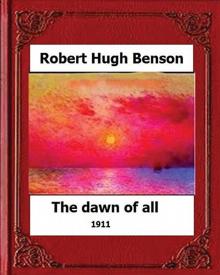 The Dawn of All
The Dawn of All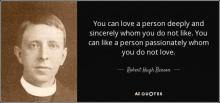 By What Authority?
By What Authority?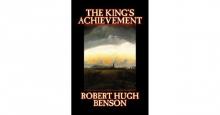 The King's Achievement
The King's Achievement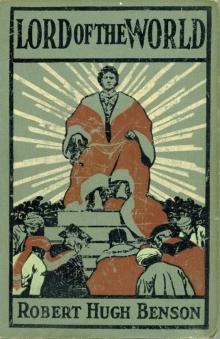 Lord of the World
Lord of the World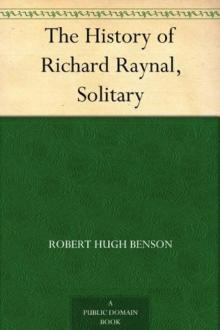 The History of Richard Raynal, Solitary
The History of Richard Raynal, Solitary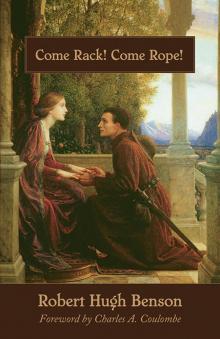 Come Rack, Come Rope
Come Rack, Come Rope